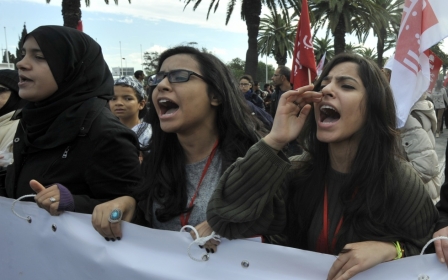Al-Qaeda claims attack on Tunisia minister's home

TUNIS- Al-Qaeda in the Islamic Maghreb said Friday it was responsible for a recent attack on the home of Tunisia's interior minister that killed four policemen, the first such claim in the country.
"A group of lions... went to cut off the head of the criminal Lotfi Ben Jeddou at his home... and God allowed them to kill a number of his personal guards," an AQIM statement said.
The statement, posted on a jihadist Internet forum, said the May 27 attack on the house in the western border region of Kasserine, had also wounded other guards and that weapons had been seized.
It added that Jeddou, who was not in the house, "got away this time, but he won't the next."
And it said that "entering into open war against Islam and its partisans to please the United States, France or Algeria, will cost dearly."
The government did not immediately comment.
Meanwhile, the interior ministry said two jihadists were killed by national guardsmen during an operation Friday in the Jendouba region to the north, and that other "terrorists" were being hunted.
Several militants and members of the security forces were killed in Jendouba in February and March.
Kasserine is situated at the foot of Mount Chaambi on a range bordering Algeria.
Since late 2012, security forces have been battling dozens of militants hiding out in the remote area.
Authorities have said all along that the militants are linked to Al-Qaeda but, until now, jihadists have not confirmed that.
But the AQIM statement said the army "has been conducting military operations against our militants in Mount Chaambi, which forced the lions of Islam to strike a military column."
Last year, more than 20 security personnel were killed in what the government says were "terrorism-related incidents".
'Campaign of arrests'
Until now, the organisation had treated Tunisia as fertile ground for preaching its ideology but not claimed any attacks since the 2011 uprising that toppled dictator Zine El Abidine Ben Ali.
Previous attacks blamed on jihadist groups in the North African country included two foiled suicide bombings at a resort town last October.
And two opposition politicians were assassinated in separate attacks that plunged the country into a political crisis.
In April, Tunis designated Mount Chaambi and neighbouring mountain districts a closed military zone, and warned of the growing threat posed by "terrorist organisations" based there.
The AQIM statement also roundly criticised the authorities that came to power after the 2011 revolution, accusing them of reproducing Ben Ali's authoritarian policies.
"They started a blind campaign of arrests against our youth," AQIM said.
The group also said the government had banned Ansar al-Sharia, a radical Salafist group, last August "to please the unbelievers."
Much of the deadly violence to hit Tunisia after the uprising was blamed on the hardline Salafist movement, which the government had previously linked to Al-Qaeda and blamed for the killing of the opposition politicians.
Tunisia has also been wary of the growing influence of Islamists in neighbouring Libya, and fears that lawlessness could spill across the border.
Stay informed with MEE's newsletters
Sign up to get the latest alerts, insights and analysis, starting with Turkey Unpacked
Middle East Eye delivers independent and unrivalled coverage and analysis of the Middle East, North Africa and beyond. To learn more about republishing this content and the associated fees, please fill out this form. More about MEE can be found here.




